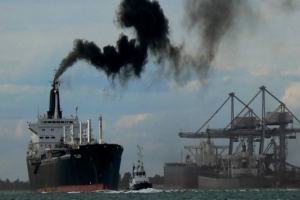


(Posted on 20/05/19)
The International Chamber of Shipping (ICS) – which represents the world’s national shipowner associations – remains confident that shipping will improve its carbon efficiency by at least 40% by 2030 compared to 2008, in line with the UN International Maritime Organization (IMO) targets to reduce greenhouse gas (GHG) emissions. This follows important decisions made by the IMO Marine Environment Protection Committee (MEPC 74) which met in London this week.
ICS Secretary General, Guy Platten commented: “We welcome the adoption of important new IMO regulations to strengthen and bring forward the application of the Energy Efficiency Design Index for several different types of new build vessel, including containerships. We are keen to see further progress on developing more short term measures to help the existing fleet reduce its emissions, and are optimistic that IMO Member States can agree some additional regulations, during 2020, combining prescriptive and goal based approaches that will deliver further GHG reductions before 2023.”
Mr Platten added “If this solid IMO momentum continues then the industry is on track to meet the 2030 target. Progress by the industry so far will be clearer after the conduct of the next IMO Greenhouse Gas Study, whose terms of reference were finalised this week. Hopefully this will confirm that the sector’s total emissions actually peaked in 2008 due to the technical and operational efficiency measures that shipping has taken since then to reduce its fuel consumption.
“Following the agreement of procedures to conduct assessments of the impacts of proposed GHG reduction measures on the economies of IMO Member States, there is no reason why IMO should not be able to quickly agree on low hanging fruit such as speed optimisation measures. We believe that these can best be addressed in part through the ‘Super SEEMP’, as proposed by ICS and other shipowner associations – the mandatory external audit of Ship Energy Efficiency Management Plans as part of the ISM Code. This will require shipping companies to demonstrate they have done everything possible to improve fuel efficiency in pursuit of the 2030 target.”
He continued “There does appear to be widespread support among many Member States for these proposals, as there also was for constructive proposals from Japan to help existing ships deliver further technical efficiencies which have much in common with the industry’s approach” Mr Platten remarked.
He added: ‘Although no final decisions have been taken it was clear that the majority of IMO Member States, including major economies such as China, India, the United States and many South American nations, had little appetite at present for initiatives such as mandatory speed limits, expressing concern that these would reduce the efficiency of maritime transport, in effect increasing the distance between economies and their markets, while acting as a disincentive to the take-up of new CO2 reduction technologies.”
Mr Platten concluded: “While short term measures are important, ICS continues to assert that IMO needs to move quickly onto considering the critical long term measures that will help the industry to deliver the very ambitious target of a 50% total cut of GHG emissions by 2050 regardless of trade growth. This can only realistically be achieved with the introduction of commercially viable zero – or near zero – CO2 emitting propulsion systems, which means that accelerated research and development programmes have to be at the centre of the IMO strategy.”
ICS also welcomes the additional guidance agreed by the IMO MEPC to assist smooth implementation of the global sulphur cap on 1 January 2020, the requirement for ships outside sulphur emission control areas to use fuel with a sulphur content of 0.5% or less.
AtoB@C Shipping, a subsidiary of ESL Shipping, has announced the successful delivery of Fleximar, the... Read more
Western Bulk, together with reputable Norwegian partners A/S J. Ludwig Mowinckels Rederi, Premium Maritime... Read more
Pacific Basin Shipping Limited, one of the world’s leading dry bulk shipping companies, has announced... Read more
Columbia Group anticipates a period of strong expansion as an increasing number of international shipowners... Read more
Norse?Ship Management has expanded its use of Smart Ship Hub’s high frequency sensor data and... Read more
As the maritime industry gears up to welcome the IMO’s STCW bullying and harassment training amendments... Read more
NORDEN has acquired the cargo activities of Taylor Maritime in Southern Africa (previously operated... Read more
Philippos Ioulianou, Managing Director of EmissionLink, has warned the IMO’s decision to delay... Read more
VIKAND has highlighted the need for cultural change in the maritime sector as reports of bullying, harassment... Read more
The maritime industry is experiencing a period of significant transformation, driven by rapidly evolving... Read more